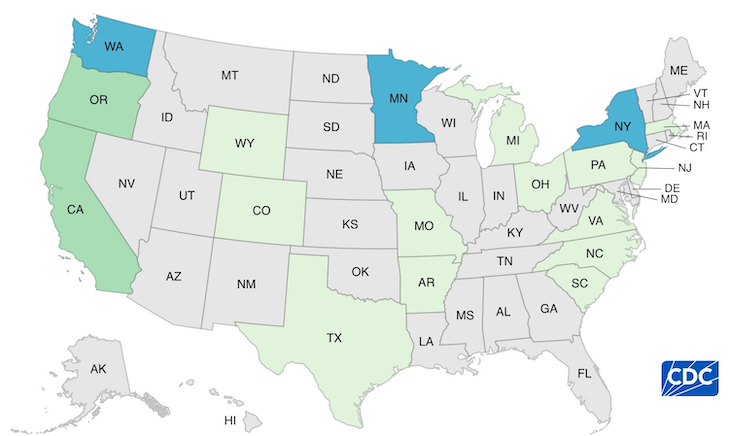A deadly Grimmway Farms carrots E. coli O121:H9 outbreak has sickened at least 39 people, hospitalized 15, and killed one person, according to the CDC. The organic carrots have been recalled.

The case count by state is: Arkansas (1), California (3), Colorado (1), Massachusetts (1), Michigan (1), Minnesota (5), Missouri (1), New Jersey (2), New York (5), North Carolina (1), Ohio (1), Oregon (3), Pennsylvania (1), South Carolina (2), Texas (1), Virginia (1), Washington (8), and Wyoming (1). Illness onset dates range from September 6, 2024 to October 28, 2024. The patient age range is from 1 to 75 years. The person who died lived in California.
Of the 27 people who were interviewed by public health officials, 26, or 96%, reported eating carrots, which is higher than the 63% of respondents who reported eating organic carrots in the FoodNet Population Survey. Of 38 people who have been interviewed, 15 have been hospitalized, for a hospitalization rate of 40%.
Public health officials are using the PulseNet system to identify patient. Whole genome sequencing suggests that people in this outbreak got sick from eating the same food, because bacteria from patient samples are closely related genetically.
Patients said they bought different brands of carrots from multiple stores. FDA’s traceback of some of these purchases identified Grimmway Farms as the common supplier of organic whole and baby carrots in this outbreak. On November 16, 2024, Grimmway Farms recalled their carrots.

Food Safety Attorney and Food Poisoning Bulletin Publisher Eric Hageman
Noted food safety lawyer Eric Hageman, who has successfully represented many clients in E. coli cases, said, “It’s unusual to see an E. coli outbreak linked to carrots, but that pathogen can contaminate any food. We hope that since the CDC has identified the outbreak, fewer people will get sick.”
Some of the carrots are still within expiration date. Please check your refrigerator carefully to see if you bought these carrots. If you did, do not eat them, even if you are going to cook them, because of the possibility of cross-contamination.
Symptoms of an E. coli infection usually start two to five days after exposure to the bacteria, but can occur as long as 10 days afterwards. Symptoms can include a fever, possible nausea and vomiting, and the characteristic severe and painful abdominal cramps and bloody diarrhea.
No one in this outbreak has developed hemolytic uremic syndrome, or HUS, which is a type of kidney failure, but this complication may still occur if there are more cases. Symptoms of HUS include little or no urine output, easy bruising, a skin rash, pale skin, and lethargy.
If you have eaten the recalled carrots and have been ill with this symptoms of E. coli, see your doctor. You may be part of this deadly Grimmway Carrots E. coli O121:H9 outbreak.

If you have been sickened with a food poisoning infection, please contact our experienced attorneys for help with a possible lawsuit at 1-888-377-8900 or text us at 612-261-0856. Our firm represents clients in lawsuits against grocery stores, restaurants, and food processors, and families in wrongful death cases.




